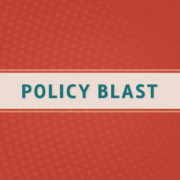NCUIH Recommendations Included in Report on Improving the Health and Safety of American Indian and Alaska Native Mothers and Infants
On December 7, 2022, the Health and Resources and Services Administration (HRSA) Advisory Committee on Infant and Maternal Mortality (ACIMM) submitted a report to the Health and Human Services (HHS) Secretary Xavier Becerra titled: “Making Amends: Recommended Strategies and Actions to Improve the Health and Safety of American Indian and Alaska Native Mothers and Infants.” The report offers a set of recommended actions that could be among the many steps the Federal government may take, both to reconcile past actions and to step up to the obligations to American Indians and Alaska Natives (AI/AN) that it has abrogated since the founding of our nation. The National Council of Urban Indian Health (NCUIH) played an integral role in the report to ensure the needs of off-reservation AI/AN mothers were included. The report offers an analysis of the historic issues and current conditions facing AI/AN women and infants in the United States, through the lens of poor birth outcomes for AI/AN mothers and babies. It highlights a toxic legacy of genocide and trauma and acknowledges centuries of detrimental policies and programs that have disadvantaged and decimated AI/AN populations.
NCUIH has advocated on the behalf of urban AI/AN maternal and infant health and has worked closely with the ACIMM on AI/AN maternal and infant health issues. On September 14, 2022, NCUIH’s Vice President of Public Policy, Meredith Raimondi, testified before the HRSA ACIMM on urban Indian disparities and policy changes to address these disparities. Raimondi highlighted that “over half of urban Indian health centers provide care for maternal health, infant health, prenatal, and/or family planning. However, due to chronic underfunding, many of these health centers only have the capacity to carry out these services for the early stages of pregnancy.” She continued to say, “despite desiring to do so, many urban Indian health clinics cannot expand their services to provide complete care for mothers and infants from conception to birth due to underfunding.”
Background
ACIMM focused its work on the birth outcomes of AI/AN mothers and infants because AI/AN populations are often overlooked in programmatic and policy discussions and investments even though their birth outcomes are among the worst in the country. Reasons for this oversight are numerous, including small population size, dispersed populations, lack of representation in decision-making spaces, and Tribes being non-state entities. The plight of AI/AN mothers and infants in the United States is a human rights issue that must be urgently addressed.
ACIMM’s report recommended three areas for strategic action framed on the premises of having healthy social and physical environment and access to high-quality care are essential to good birth outcomes; racism and the devaluing of AI/AN women disproportionately affects this population which negatively impact maternal and infant health outcomes and mortality; and AI/AN people have inherently protective practices embedded in their culture that contribute to their ongoing resilience.
- Make the health and safety of AI/AN mothers and infants a priority for action.
- Improve the living conditions of AI/AN mothers and infants and assure universal access to high quality healthcare.
- Address urgent and immediate challenges that disproportionately affect AI/AN women before, during, and after pregnancy.
Infant and Maternal Health Disparities in Native Health
According to the Office of Minority Health (OMH), Native infants have almost twice the infant mortality rate as non-Hispanic whites. Native infants are also almost three times more likely than non-Hispanic whites to die from accidental deaths before the age of one year. Contributing factors to these disparities include cost, discrimination, and lack of cultural competency during prenatal care. Additional ongoing and historical trauma due to colonization, genocide, forced migration, and cultural erasure also contribute to health inequities, including pregnancy-related deaths and other maternal health conditions. Approximately 41% of AI/AN women cite cost as a barrier to receiving the recommended number of prenatal visits and 23% of AI/ANs report they have faced discrimination in clinical settings due to being an AI/AN. Consequently, AI/AN people are more likely to have underlying chronic health conditions, and they face systemic barriers to care including higher rates of poverty and needing to travel long distances to receive quality health care services.
NCUIH’s work with AI/AN Maternal and Infant Health
The National Council of Urban Indian Health (NCUIH) has engaged in extensive advocacy on behalf of AI/AN mothers and infants and for increased funding and support to the UIOs which provide maternal health, infant health, prenatal, and family planning services to AI/AN mothers and infants. In March 2022, NCUIH signed onto a letter to Congress led by the National Home Visiting Coalition in support of reauthorizing HRSA’s Maternal, Infant, and Early Childhood Home Visiting Program (MIECHV) and doubling the Tribal set-aside – which includes UIOs. Additionally, in August, NCUIH submitted comments to HRSA’s Maternal and Child Health Bureau (MCHB) regarding the Pediatric Mental Health Care Access Program. In our comments, we have continued to stress the critical importance of including urban Natives populations in HRSA’s overall efforts of improving health outcomes for all AI/ANs living on and off reservations. NCUIH also released an infographic showcasing data on infant and maternal health disparities in AI/AN communities.





Leave a Reply
Want to join the discussion?Feel free to contribute!